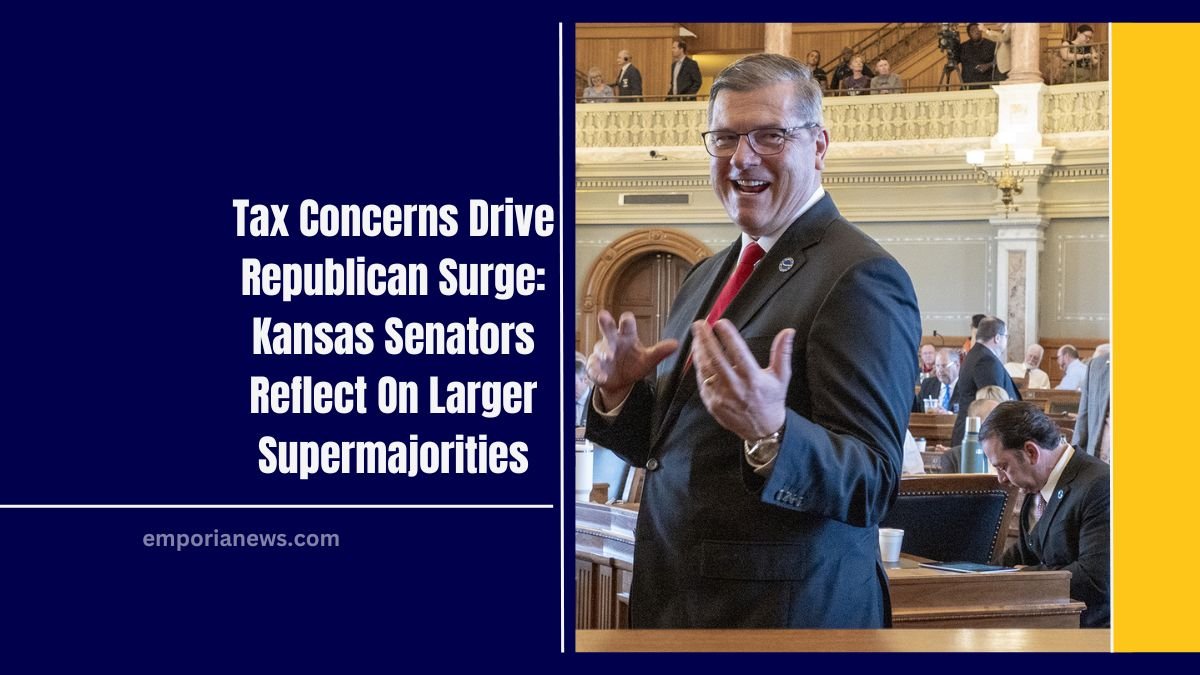Kansas politics witnessed a seismic shift with the expansion of Republican supermajorities in the state legislature.
Newly elected Republican senators Brad Starnes and Jeff Klemp believe that tax concerns among voters played a pivotal role in their victories and the GOP’s strengthened position.
With property tax relief and economic priorities taking center stage, here’s a closer look at how these developments could shape Kansas’ legislative future.
Tax Concerns Propel Republican Victories
1. Property Tax Relief Tops the Agenda
Both Starnes and Klemp attribute their wins to voters’ frustrations with high taxes, particularly property taxes. They argue that tax relief will be a Day 1 priority for the expanded Republican-led legislature.
- Starnes’ Perspective: “People are hurting. Taxes are the No. 1 concern,” Starnes said, emphasizing the need for swift action on property tax reforms.
- Klemp’s View: Highlighted how voters reacted to Democratic incumbents opposing the bipartisan $2.3 billion five-year tax cut plan, which Gov. Laura Kelly vetoed due to financial concerns.
2. Historical Wins and Narrow Margins
- Brad Starnes: Became the first Republican to win Riley County’s Senate seat since 2008.
- Jeff Klemp: Secured his victory in Wyandotte and Leavenworth counties by just 31 votes, marking the smallest margin of the election.
Republican Supermajority: What It Means
With an expanded supermajority in both chambers, Republicans now exceed the two-thirds threshold required to override gubernatorial vetoes.
Despite concerns raised by Democrats about power imbalances, Starnes views the supermajority as an opportunity for greater accountability.
Key Implications:
- Tax Legislation: The GOP’s stronghold could pave the way for sweeping tax reforms.
- Medicaid Expansion: While Gov. Kelly advocates for expansion, both Starnes and Klemp favor alternatives like improved Medicaid reimbursement rates.
- Abortion Laws: Although endorsed by Kansans for Life, both senators downplayed abortion as a key election issue, calling it a “decided matter.”
Policy Positions of Starnes and Klemp
1. Tax Reform
The senators-elect stress the need for property tax relief and better alignment of tax policies with constituent interests. They believe their Democratic opponents voted against the will of their districts on key tax measures.
2. National Security and Land Ownership
Starnes criticized his opponent’s vote against the “foreign threat” land ownership bill, which would restrict certain countries from purchasing real estate near Kansas military installations like Fort Riley.
3. Social and Economic Policies
- Abortion: Both senators expressed pro-life stances but emphasized the importance of providing better support for pregnant individuals and reducing adoption costs.
- Medicaid: They are cautious about expansion but propose alternatives to improve healthcare affordability.
| Priority Area | Starnes’ Focus | Klemp’s Focus |
|---|---|---|
| Property Tax Relief | Immediate reforms for constituents. | Supporting bipartisan tax cuts. |
| Medicaid Alternatives | Improve reimbursement rates. | Oppose expansion, favor targeted fixes. |
| National Security | Restrict foreign land ownership. | Align policies with military interests. |
| Abortion Policy | Expand options for pregnant women. | Support pro-life policies with resources. |
The Role of Voter Concerns in the GOP Surge
Democrats, led by Gov. Kelly, campaigned aggressively to prevent the expansion of Republican supermajorities.
However, concerns over taxes and perceived misalignment of Democratic incumbents with voter interests contributed to the GOP’s success.
- Gov. Kelly’s Efforts: Invested $2 million in a PAC to boost Democratic candidates.
- Outcome: Voters increased the Republican majority, signaling a preference for tax reforms and conservative fiscal policies.
The victories of Brad Starnes and Jeff Klemp, along with the expanded Republican supermajorities, signal a decisive shift in Kansas politics.
With a strong focus on property tax relief, national security, and healthcare reforms, these senators are poised to make significant changes in the upcoming legislative session.
As Kansas navigates these political shifts, the priorities of its constituents—lower taxes, enhanced security, and affordable healthcare—will likely shape the state’s policy landscape in 2025 and beyond.
FAQs
What does the Republican supermajority mean for Kansas politics?
The expanded supermajority allows Republicans to override gubernatorial vetoes and advance key legislation on taxes, healthcare, and social issues with minimal opposition.
What tax reforms are expected from the new Republican senators?
Property tax relief is expected to be a top priority, along with discussions on bipartisan tax cuts and economic reforms.
How did national security influence the election?
Starnes highlighted concerns over foreign land ownership near military installations, a significant issue for districts with military ties like Fort Riley.




